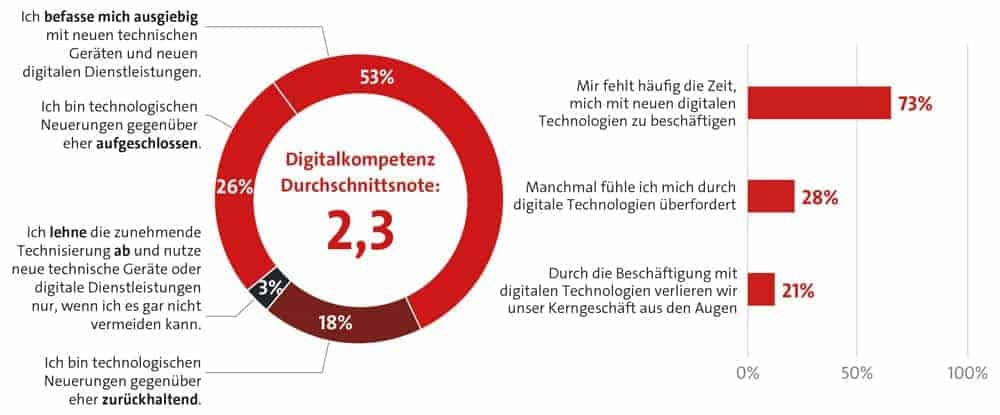![[shutterstock.com: 558833797, Peshkova]](https://e3mag.com/wp-content/uploads/2020/06/shutterstock_558833797.jpg)

Around one in six (16 percent) rate their own digital competence as Very good, while one in three (34 percent) rate themselves as Good. On average, they give themselves the school grade Good (2.3).
However, there is also a fundamental skepticism towards new technologies and many lack the time to deal with them. A further 39 percent currently give themselves the grade Satisfactory, and only four percent Sufficient. This is the result of a representative survey of 603 companies from all sectors commissioned by the digital association Bitkom.
At the same time, 18 percent of respondents say they are rather reluctant to embrace technological innovations, and three percent even reject "increasing mechanization" and say they only use new technical devices or digital services if they can't avoid it.
"Digitization is a matter for the boss. Anyone who bears responsibility and even views digital technologies with suspicion is endangering the future viability of their company."
says Bitkom President Achim Berg.
"The Corona crisis has shown us the importance of digital technologies for our economy. Companies that are better digitized have a clear competitive advantage, especially in times of crisis."
The vast majority of managing directors and board members are very open-minded about digital technologies. A quarter (26 percent) deal extensively with new devices and digital technologies and are happy to use new products when they come onto the market.

One in two (53 percent) tend to be open to technological innovations and use them when there is clear added value. However, three out of four managers (73 percent) state that they often lack the time to deal with new digital technologies.
This is despite the fact that two-thirds feel that digital technologies make their private (70 percent) and professional (68 percent) lives easier. One in four (28 percent) sometimes feels overwhelmed by digital technologies.
One in five (21 percent) even fears losing sight of their core business as a result of their involvement with digital technologies.
"No one should blindly throw everything tried and true overboard and rely only on 'digital'"
says Berg.
"But everyone should at least be aware that in virtually all industries, the future of business models is digital. Not rushing into anything doesn't mean never taking the leap."






